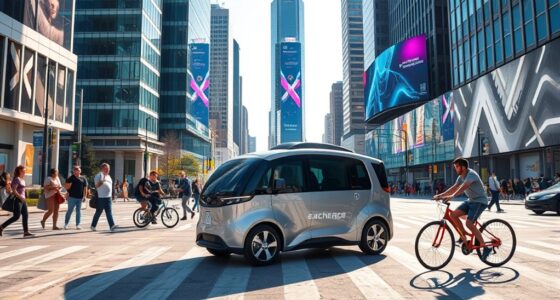AI agents are transforming workflows by enabling autonomous, collaborative tasks that boost efficiency and cut errors. They handle repetitive activities and assist in complex decision-making, freeing you to focus on strategic work. These bots work alongside you, sharing data and adapting in real-time to improve operations. As they reshape how work gets done, they make processes more flexible and responsive — learn how to harness this shift for your advantage.
Key Takeaways
- AI agents automate repetitive and complex tasks, increasing efficiency and freeing human workers for strategic activities.
- They enhance real-time collaboration, enabling seamless data sharing and adaptive workflow adjustments.
- Autonomous bots streamline operations, reducing errors and accelerating project completion times.
- Ethical design and transparency build trust, ensuring AI actions align with organizational values and fairness.
- Proper oversight and accountability frameworks are essential to prevent misuse and address potential biases.

AI agents are computer programs designed to perform tasks autonomously by perceiving their environment and making decisions. This ability to operate independently allows these agents to transform how you approach workflows, especially through collaborative automation. Instead of isolated tasks, AI agents can work seamlessly alongside humans, handling repetitive or complex activities while you focus on strategic or creative work. Imagine a team where AI agents coordinate with your human colleagues in real time, sharing data, making adjustments, and optimizing processes without constant oversight. This collaboration streamlines operations, reduces errors, and accelerates project timelines, making workflows more efficient and agile. Incorporating AI agents also raises important questions about transparency and accountability, ensuring that their decision-making processes are understandable and responsible. However, integrating AI agents into your workflow brings significant ethical considerations. As these autonomous systems make decisions that can impact people, organizations, and data privacy, you need to guarantee their actions align with ethical standards. This means scrutinizing how AI agents handle sensitive information, prevent biases, and maintain transparency in their operations. For example, if an AI agent is involved in customer service or hiring processes, it must operate fairly and avoid perpetuating discrimination. You also have to contemplate accountability—who’s responsible if an AI agent makes a mistake or causes unintended harm? Establishing clear guidelines and oversight is vital to prevent misuse and build trust with users and stakeholders.
The ethical considerations extend to the design and deployment of collaborative automation. You should prioritize creating AI agents that complement human decision-making rather than replacing judgment entirely. This approach fosters a partnership where humans provide oversight, context, and moral reasoning, while AI handles data-driven tasks. It’s also essential to implement transparency measures—making sure users understand how decisions are made and what data is involved. Doing so not only helps prevent bias but also reassures users that AI agents are working ethically within your organization’s values.
Frequently Asked Questions
What Industries Will Benefit Most From AI Agent Integration?
You’ll find industries like supply chain and customer service benefit most from AI agent integration. In supply chains, autonomous bots optimize logistics, reduce delays, and cut costs. In customer service, they handle inquiries swiftly, improving satisfaction. These bots streamline workflows, making operations more efficient. As a result, these sectors gain agility and better customer experiences, giving you a competitive edge in today’s fast-paced market.
How Do AI Agents Impact Employee Roles and Job Security?
You might worry about job displacement, but AI agents mainly drive skill transformation. Instead of replacing you, they handle repetitive tasks, freeing you to focus on strategic and creative work. This shift can enhance your role, making your skills more valuable. Embrace the change, as AI empowers you to grow professionally, ensuring your job remains secure by adapting to new tools and responsibilities.
What Are the Ethical Considerations of Deploying Autonomous Bots?
When deploying autonomous bots, you face important ethical considerations like bias mitigation and accountability standards. You need to guarantee these bots operate fairly and transparently, preventing biases from influencing decisions. You also must establish clear accountability standards so that it’s clear who’s responsible if things go wrong. By addressing these issues, you protect users’ rights and build trust in your AI systems, fostering responsible and ethical adoption.
How Is Data Privacy Managed With AI Agent Workflows?
You should prioritize managing data privacy by addressing privacy concerns and implementing robust data encryption methods. As you deploy AI agent workflows, guarantee sensitive information is protected through secure encryption, and restrict access to authorized personnel. Regularly review privacy policies and stay compliant with regulations like GDPR. This proactive approach helps you mitigate risks, safeguard user data, and maintain trust while enabling efficient AI-driven processes.
What Skills Will Workers Need to Collaborate With AI Agents Effectively?
Think of your collaboration with AI agents as a dance—smooth, intuitive, and in sync. You’ll need strong human-computer interaction skills to communicate clearly and adapt quickly. Emotional intelligence becomes your rhythm, helping you understand and manage responses from both colleagues and bots. Developing these skills guarantees you work seamlessly with AI, turning technology into your partner rather than an obstacle, and opening new levels of productivity and innovation.
Conclusion
As you embrace AI agents, you’ll find your workflows transforming rapidly. Imagine, by 2025, over 70% of business processes could be partly or fully automated with autonomous bots. This shift means you’ll spend less time on repetitive tasks and more on strategic thinking. Staying ahead requires understanding these tools and adapting quickly. The future’s here, and AI agents are leading the way—so, get ready to redefine how you work.








